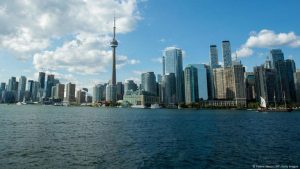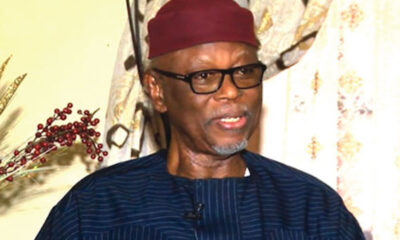Trending
The 51st US state? How Canada might take on Donald Trump
US President-elect Donald Trump threatened Canada with 25% tariffs and even quipped about a merger of the nations. The North American neighbors have strong economic links, so a trade dispute would have a heavy impact.

Canada’s economy could be plunged into recession if Trump imposes 25% tariffs
© Valerie Macon/AFP/Getty Images
“Blame Canada!” goes the satirical song from the 1999 animated comedy film “South Park: Bigger, Longer & Uncut,” in which a mother rallies her small Colorado town to confront youth degeneracy.
The song humorously shifts blame to the US’s northern neighbor rather than the policies of the government of the United Statespolicies, parenting failures or media influence, declaring that “we need to form a full assault — it’s Canada’s fault.”
Decades later, US President-elect Donald Trump appears to be channeling a similar energy, blaming Canada for illegal migration and drug trafficking across the northern border.
Weeks after winning a second term in the White House, Trump threatened to impose 25% tariffs on all Canadian imports — including cars and automotive parts — starting on his first day in office.
He has since stepped up his rhetoric, joking that Canada could even be annexed as the 51st US state. He even mocked the Canadian Prime Minister Justin Trudeau — who resigned last weekamid plummeting approval ratings — by calling him the “Governor” of the “Great State of Canada.”
Trump bombast or threat to be tackled?
While some analysts believe the rhetoric is typical Trump bluster, his remarks have been widely condemned by Canadian politicians and economists as Canada wasn’t a major target for the Republican candidate during the US election campaign — unlike China, Mexico, BRICS and NATO.
“It came like a bolt from the blue,” Douglas Porter, chief economist of the Bank of Montreal (BMO), told DW, referring to Trump’s attack. “There was no groundswell among his supporters that saw Canada as a big villain … so I find this one a bit more unnerving.”
Porter said Trump’s reasoning appears to be changing as he prepares to take office on January 20.
“Initially, there were concerns about the border, which I think Canada would be happy to address. Then there was talk about the US-Canada trade imbalance. And in his press conference the other day, Trump talked about imposing economic hardship on Canada,” he said.

Canada produced more than 1.5 million motor vehicles in 2023, many for the US market
© Chris Young/The Canadian Press/ZUMA Press/picture alliance
Despite championing and signing the United States-Mexico-Canada Agreement (USMCA), which took effect in 2020, Trump now says Washington’s neighbors have failed to meet key terms in the accord, from border control to trade. The deal is up for review next year.
Trump “is known to rip up his own deals to secure even better deals,” Tony Stillo, Director of Canada Economics at the economic advisory firm Oxford Economics, told DW. “Even though he helped negotiate the USMCA that replaced NAFTA (North American Free Trade Agreement), he’s now calling it the worst deal ever.”
The US does, however, have far worse trade imbalances with China, Mexico, Vietnam, Germany, and Japan than with Canada, which was nearly $55 billion (€53.6 billion) from January to November last year, according to the US Census Bureau.
By comparison, the US-China trade imbalance was almost five times higher during that same period, at $270.4 billion. The US-Canada trade imbalance has fallen by about a quarter over the past two years. However, it was much lower before the pandemic and the USMCA took effect.
Canada getting US subsidy, says Trump
Trump wrote on his Truth Social messaging platform this week that the imbalance is effectively a US subsidy to Canada, saying the world’s largest economy “can no longer suffer the massive Trade Deficits that Canada needs to stay afloat.”
US-Canada trade is one of the most extensive and integrated partnerships in the world. In the first 11 months of 2024, $699.4 billion in trade was conducted between the countries. Canada is the largest market for US exports, ahead of Mexico, Europe and China. US exports include trucks, vans, cars and auto parts, as well as fossil fuels.
The United States is also Canada’s top export destination, with more than three-quarters of outbound goods and services heading across the southern border. For comparison, 53% of Germany’s exports go to other European Union nations.
Crude oil makes up a quarter of Canada’s exports southward, which in July 2024 reached a record 4.3 million barrels per day, according to the US Energy Information Administration (EIA).
Thanks to surplus US processing capacity, the US refines the crude oil into gasoline, diesel, and jet fuel for domestic use and re-export — some of it back to Canada.

Despite the US being a major oil producer, the country imports millions of barrels of crude oil from Canada
© Jeff McIntosh/The Canadian Press/AP Photo/picture alliance
Trouble for oil and auto sectors
Danielle Smith, the premier of the oil-rich Canadian province of Alberta, warned the US would be shooting itself in the foot if Trump makes good on his threats, writing this week on X that: “Any proposed tariffs would immediately hurt American refiners and also make consumers pay more at the pumps.”
Trump’s ire has also targeted Canada’s automotive industry, which the president-elect says has shifted manufacturing across the northern border in recent years, resulting in layoffs for American workers.
However, North America’s auto sector is deeply integrated and parts and vehicles often cross the US-Canada border multiple times during production.
Canadian auto executives have warned that tariffs could disrupt complex supply chains, leading to increased costs and inefficiencies — spiking prices for new vehicles in both countries.
“If you tariff at 25% every time it [an auto part] goes across a border, the costs become ridiculous,” William Huggins, assistant professor at McMaster University’s DeGroote School of Business, told DW.
Canada’s BNN Bloomberg this week cited economists as saying the US tariffs could shrink Canada’s gross domestic product (GDP) by 2-4% and may tip the economy into recession.
Ottawa readies tit-for-tat measures
Canada’s ruling Liberal Party won’t elect Trudeau’s successor until March 9. While his departure leaves his country politically rudderless, Canadian policymakers have devised a list of US imports that might face retaliation if Trump proceeds with his tariff plan.
The analysts DW spoke with said Canada is likely to pursue tariffs on politically and economically sensitive US products as it did under a similar trade row with Trump in 2018 and which was resolved a year later.
The Global & Mail newspaper reported this week that Ottawa is considering tariffs on US steel, ceramics, glass, flowers and Florida orange juice, among other goods.
“They [The Canadian side] have only identified a handful of sectors because they don’t want to put everything on the table yet to undermine their negotiating position,” Stillo said.
But with mostly bluster and outlandish threats to go on, Canada’s leaders are yet to know exactly what Trump is seeking. Are his tariff threats a negotiating tactic to improve border control, boost energy and automotive cooperation or hike Canada’s contributions to NATO?
“We’re not dealing with an enlightened multi-step US policy,” Huggins said. “We’re dealing with a bully who said, ‘Give me your lunch money,’ so we’re probably going to give them the change in our pockets.”
But despite the short-term disruption to both nations’ economies, the McMaster University economist thinks policymakers in Ottawa will look to play the long game, for one obvious reason.
“30 years from now, Donald Trump won’t be alive, but Canada will be,” Huggins told DW.
Edited by: Uwe Hessler
Editor’s note: This article was updated on January 12, 2025, to reflect that the US Census Bureau data for 2024 shows trade from January through November.
Author: Nik Martin
Trending
Gunmen k!ll President General of Ogidi community and one other in Anambra.

Unidentified gunmen, suspected to be cultists, have k!lled a community leader and one other person in Anambra State.
The President-General of Ogidi community in Idemili North Local Government Area of Anambra State, Ikwuka Okoye, popularly known as Anumili (pictured above), was k!lled on Friday, Feb. 6.
The attack was alleged to have been carried out by members of a rival cult group in revenge for the de@th of their leader, who was arrested and k!lled by local security operatives.
During the attack, which took place at the School Field, Ogidi, another man whose identity has yet to be ascertained was also gunned down.
The spokesman for the Anambra State Police Command, SP Tochukwu Ikenga, confirmed the incident in a press statement on Saturday.
Ikenga said the incident is allegedly linked to the recent capture and k!lling of a known notorious cultist within the community.
He said, “The Anambra State Police Command regrets the murd£r of the President-General of the Ogidi community and one other person. The incident, which occurred on the evening of February 6, 2026, at the School Field, Ogidi, is allegedly linked to the recent capture and k!lling of a known notorious cultist within the community.
“Following the report, police operatives swiftly took over the scene of the incident and commenced investigations. The command is currently working with eyewitness accounts and other available intelligence to identify and arrest the perpetrators.
“The Anambra State Police Command assures members of the public that all efforts are being intensified to bring those responsible to justice.
“Residents are urged to remain calm and cooperate with the police as investigations continue.
“Further developments will be communicated in due course.”

Trending
Police bust syndicate behind nude photo blackmail in Lagos

Men of the Police Special Fraud Unit (PSFU), Lagos, have apprehended three suspects who allegedly run a cyber blackmail and extortion scheme in the state.
According to the spokesperson of the unit, DSP Ovie Ewhubare, the suspects get a hold of their victims explicit photos and then threaten to release them if a ransom is not paid.
He said that the suspects, two males and a female, were apprehended after a petition was filed by a complainant who reported being repeatedly threatened by unknown individuals demanding money.
“The complainant received several phone calls in which the callers threatened to release her nude photographs to the public if she failed to pay them. Acting out of fear and emotional distress, she transferred money to the suspects.
The situation escalated when the suspects demanded an additional N10 million, prompting her to formally petition the police,” he said
The police imagemaker state dthat upon receipt of the complaint, the Commissioner of Police, PSFU, Mr Kayode Ojapinwa, ordered the immediate deployment of operatives to investigate the matter.
“The investigation led to the arrest of the three suspects. Investigations revealed that one of the suspects gained unlawful access to the complainant’s mobile device and fraudulently transferred her nude photographs to his own device. Further findings indicated that he conspired with the other suspects and other accomplices currently at large to demand and receive money from the complainant in several tranches,” he said
According to him, the suspects are currently in police custody and are expected to be arraigned before a court of competent jurisdiction.
The image maker said that investigations were ongoing to apprehend other fleeing members of the syndicate and to recover all proceeds of the alleged crime.
Trending
Catholic Priest Collapses And D!es In Front Of Congregation While Walking To Tabernacle To Return Holy Communion

A Catholic priest has tragically passed away after suddenly collapsing in front of the congregation during Sunday mass.
The tragic incident took place last Sunday, February 1 in Wiesmath in the district of Wiener Neustadt, Austria.
Shortly after administering Holy Communion, 59-year-old priest Raimund Beisteiner was about to return the host to the tabernacle when he “suddenly” collapsed, according to a statement from the Archdiocese of Vienna.
“Despite immediate professional assistance, he di£d in the church,” the statement said.
The mayor of Wiesmath, Erich Rasner, had also attended the Mass with many other believers and witnessed the dramatic scenes.
The shock in Wiesmath at the loss of the popular priest is great. Beisteiner had shaped the spiritual life of the parish for almost two decades and was highly regarded far beyond the community.
Rasner praised him as an “extremely conscientious, sensitive priest” and also emphasized the personal loss of a friendship that had grown over many years.
A prayer service was organized at short notice for the late priest. It was attended by numerous priests from the deanery as well as Archbishop Josef Grünwidl.


-
Business1 year ago
US court acquits Air Peace boss, slams Mayfield $4000 fine
-

 Trending1 year ago
Trending1 year agoNYA demands release of ‘abducted’ Imo chairman, preaches good governance
-

 Politics1 year ago
Politics1 year agoMexico’s new president causes concern just weeks before the US elections
-

 Politics1 year ago
Politics1 year agoPutin invites 20 world leaders
-

 Politics1 year ago
Politics1 year agoRussia bans imports of agro-products from Kazakhstan after refusal to join BRICS
-
Entertainment1 year ago
Bobrisky falls ill in police custody, rushed to hospital
-
Entertainment1 year ago
Bobrisky transferred from Immigration to FCID, spends night behind bars
-
Education1 year ago
GOVERNOR FUBARA APPOINTS COUNCIL MEMBERS FOR KEN SARO-WIWA POLYTECHNIC BORI













